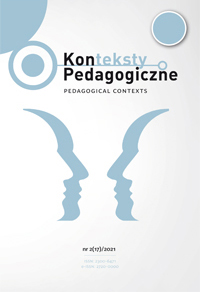Abstract
Constructivism in a teacher’s work gives his pupils the ability to explore their own layers of knowledge and allows to change their views on new, self-constructed knowledge. The implementation of the constructivist method in the work of a teacher educating pupils with special educational needs is a challenging task, specifically in the case of children with sensory impairment. Many special educators, including those in the deaf education field are choosing the constructivist method of transferring knowledge. The search of methods and development of educational programs in a way that they are close to the child with hearing impairment and provide possibilities of knowledge exploring has been greatly disturbed by the COVID-19 pandemic. People’s health and lives have become a new determinant of new forms of education. Avoiding a virus infection from one another has moved the education from schools and educational facilities to the internet, thus creating a new remote form of knowledge sharing. This situation has not been predicted by anyone before. It created a disorder of everyday life on its every dimension: private, family, professional, economic and educational. Chaos appeared in the once planned and methodical work of a teacher and his pupils. Tutors and their pupils, including those with special educational needs found themselves in the situation that required working with the use of ICT technology. The teachers and special education specialists, tirelessly caring for the best education effects, are now going through the difficult remote education process along with their pupils with special educational needs. The previously used methods of work cannot be used any longer. The aim of the article is to show the specificity of professional activity of a surdopedagog and surdopedagog-constructivist during distance learning, while improving their teaching skills in this mode of education.
References
Barnes, D. (1988). Nauczyciel i uczniowie. Od porozumiewania się do kształcenia, tłum. J. Radzicki. Warszawa: Wydawnictwa Szkolne i Pedagogiczne.
Bołtuć, P. (2011). Konstruktywizm w e-edukacji oraz jego krytyka. E-mentor, 4(41), 48–55.
Chorab, G. (2017). Nauczyciel w paradygmacie konstruktywistycznym. Szkoła – Zawód – Praca, 13, 45–54.
Fazlagić, J. (2020). Nowe wyzwania w zarządzaniu szkołą. Dyrektor Szkoły, 7, 14–16.
Godawa, G. (2020). Zdalne nauczanie. Bilans zysków i strat ponoszonych przez dziecko. Wychowawca, 10, 8–9.
Klus-Stańska, D. (2018). Paradygmaty dydaktyki. Myśleć teorią o praktyce. Warszawa: PWN.
Korzon, A. (1999). Efektywny surdopedagog w opinii nauczycieli i uczniów z wadą słuchu. W: J. Pańczyk i W. Dykcik (red.), Pedagogika specjalna wobec zagrożeń i wyzwań XXI wieku. Materiały z obrad XVI sekcji III Zjazdu Pedagogicznego w Poznaniu (21–23 wrzesień 1998) (s. 188–195). Poznań: Wydawnictwo UAM.
Majewicz, P. i Mikrut, A. (2008). Kompetencje pedagoga w kontekście teorii i praktyki edukacji specjalnej. Gliwice–Kraków: Oficyna Wydawnicza „Impuls”.
Olszak, A. (2001). Psychopedagogiczne kompetencje nauczycieli szkół specjalnych. Lublin: Wydawnictwo UMCS.
Palak, Z. i Papuda-Dolińska, B. (2014). Samoaktualizacja jako istotny wymiar kompetencji zawodowych pedagoga specjalnego. Annales Universitatis Mariae Curie-Skłodowska, sectio J – Paedagogia-Psychologia, 27(2), https://www.journals.umcs.pl/j/ article/view/129/0 [dostęp: 1.03.2021].
Pawłowska, S. (2020). Szkoła w czasach pandemii. Remedium, 5, 2–5.
Plutecka, K. (2006). Kompetencje zawodowe surdopedagoga z wadą słuchu. Kraków: Oficyna Wydawnicza „Impuls”.
Podgórska-Jachnik, D. (2013). Drugi, trzeci, czwarty. Poszukiwanie sensu pracy pedagoga specjalnego w różnych estetykach wychowawczych. Studia Edukacyjne, 28, 209–225.
Pyżalski, J. (2020). Co jest obecnie ważne, a co mniej w działaniach szkół i nauczycieli. W: J. Pyżalski (red.), Edukacja w czasach pandemii wirusa COVID-19. Z dystansem o tym, co robimy obecnie jako nauczyciele. Warszawa: EduAkcja.
Rubacha, K. (2003). Budowanie teorii pedagogicznych. W: Z. Kwieciński i B. Śliwerski (red.), Pedagogika. Podręcznik akademicki, t. 1 (s. 59–68). Warszawa: PWN.
Zaorska, M. (2008). Kompromis i ustępstwo w pracy pedagoga specjalnego. W: Z. Palak (red.), Pedagog specjalny w procesie edukacji, rehabilitacji i resocjalizacji (s. 151–161). Lublin: Wydawnictwo UMCS.
In accordance with the recommendation of the Ministry of Science and Higher Education, which aims to counteract the practice of “ghostwriting” and “guest authorship,” all authors submitting their text for publication should attach an author’s statement which declares the contribution of each of the authors to the article. The printed and signed statement should be delivered by mail or other means to editor-in-chief Joanna Skibska or sent in the form of a scan to the following e-mail address: redakcja@kontekstypedagogczne.pl. The authors will not receive remuneration for publishing their papers. The editors reserve the right to make minor editorial changes to the articles which will not affect the substance of the article. We encourage all authors to prepare their articles in accordance with the guidelines for manuscript preparation. Download pdf file.
Authors transfer all copyrights and grant the journal the right of first publication with the work simultaneously licensed under a Creative Commons Attribution License that allows others to share the work with acknowledgement of the work's authorship and initial publication in this journal. All authors agree to the publishing of their email addresses, affiliations and short bio statements with their articles during the submission process.

